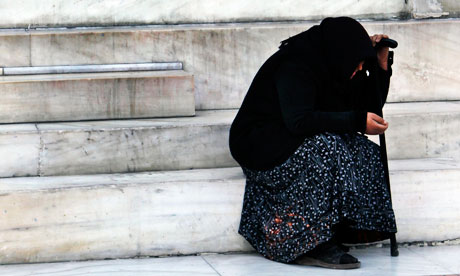Helena Smith in Athens guardian.co.uk, Wednesday 5 December 2012 20.55 GMT
With 30,000 homes a day cut off for unpaid bills by the state, corruption has become a matter of survival for many Greeks
An old woman begging in Greece, where one in three now live below the poverty line. Photograph: Yannis Behrakis/Reuters
On top of the litany of woes that have befallen Greece, comes the news that the euro zone's weakest link is also its most corrupt. From holding 80th place in the 176 countries on Transparency International's corruption perceptions index in 2011, Greece's global ranking, this year, fell to 94, the global watchdog announced on Wednesday. In terms of perceived levels of public corruption, Greece was on a par with Moldova and Mongolia. In the 27-strong EU, there was no other state that fared worse.
For economic experts who were surveyed for the report, the finding will be further proof that Greece is not just an economic basket case that is only barely keeping bankruptcy at bay but entrenched in a crisis of values that, like its debt drama, refuses to go away.
For Costas Bakouris, who spends his time exclusively monitoring corrupt practices as the head of Transparency International's Greek chapter, the survey underscores the desperate need for the nation at the heart of Europe's financial mess to organise a fresh political way of operating.
"We need to create a political system where politicians care more about the fate of the country than themselves," he told the Guardian.
"In short, we need to make politicians accountable," he said, emphasising that wanting ethical standards had played a pre-eminent role in bringing the country to "this critical place".
Ironically, most Greeks would agree. Corruption, as many now understand, was the thorn in the side of a society that held back economic enterprise and competition. It was their nation's overarching affliction.
But the drop will also come as little surprise. And, for many, it will have less to do with the lack of role models – and punishment, or not, meted out to corrupt politicians – as it will do to the sheer need to survive.
In a country not only mired in a fifth straight year of recession but enduring a third year of unprecedented austerity, where one in three now lives below the poverty line and a quarter of the population is unemployed, corruption is a means to an end.
It is, say analysts, the flipside of austerity in an economy in freefall. "To survive in such a hostile situation, you have to bend the rules," said political commentator Giorgios Kyrtsos. "There is no other way when things are so hard – you are forced to resort to corruption to deal with the state mechanism."
Economics professor Theodore Pelagides says rampant tax evasion is a case in point. With VAT at 23%, thanks to policies mandated by Greece's creditors at the EU and International Monetary Fund, withholding of official receipts has assumed proportions that even by the standards of pre-crisis Greece have become chronic.
"People have been pushed to their limits. They have calculated in a very rational way that avoidance of such receipts is a necessity at a time when they have been hit by so many wage cuts and unexpected taxes," Pelagides said. "We should not be at all surprised by the report's findings."
Will it get worse? Very likely, yes. This week another global survey conducted by the consultancy group Mercer found that, in Athens, citizens endured the worst quality of life of any major European city. It was also the 78th most expensive of the 214 cities that were surveyed.
With no prospect of development or growth to get them out of the economic depression, and more biting belt-tightening measures on the way, Greeks are the first to say they fear "a jungle-like" mentality is bound to emerge.
Desperation is on the rise with the state power company DHE reporting it is cutting off electricity supplies in an estimated 30,000 homes every day as bills, which now include a hefty property tax, go unpaid.
"Our country is being destroyed a little more every day," said Tassos Vassiliou, who runs an electric supplies store in a downtown office.
"This shop has been in my family for more than 100 years and at Christmas we will close. We will open up in my family home next door, but don't ask for a receipt because we won't be giving them out."
![The [Greek] European Tragedy](https://blogger.googleusercontent.com/img/b/R29vZ2xl/AVvXsEiWKI5s90SFm1wWTk6bs4p7CgslaC2SnYPsrZhb-B-smOufNNCSxCvpBLI9hOB-LsXZjir_PNmEiMk2-E62F3xkg96IoC6QFAaZAnPRTVH340IN9WBRmWJqPkjWlgyRj3zpALp7h6hvA58/s920/GkBack_new.jpg)

